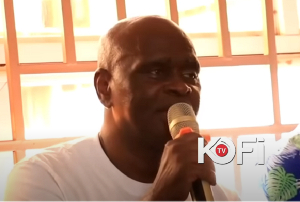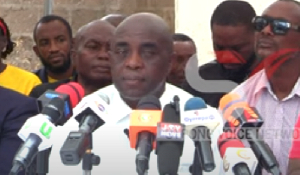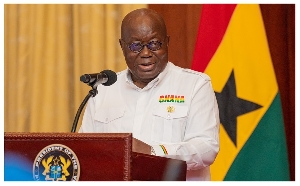Opinions of Thursday, 16 April 2009
Columnist: Tsuo, Cedric
President Mills, Please Break the Cycle of Impunity Now!
The storm over the 3 state BMWs that former president John Kufour removed from the presidency when he left office in January 2009 rages on, though it has lost some of its initial force. But the protagonists continue as ever to hold their respective entrenched defensive positions. Hard on the heels of that is yet another controversy that is proving more divisive and potentially dangerous for the stability of the country. At the centre of this new controversy is a government bungalow at Ridge that Mr. Kufour reportedly “acquired” for use as his official office some time prior to leaving office. The problem of the 3 BMWs appears to have been “resolved”, at least for now, to the satisfaction of the presidency but to the chagrin of the former president and his supporters. But resolution of the problem of the bungalow looks intractable, as different factions, including various Ga traditional interest groups, have leapt headlong into the fray, some demanding restitution of that property, as well as other traditional lands, to them.
The involvement of the later group, claiming ownership of the Ridge government bungalow, opens a can of worms, indeed, a new and potentially explosive front in the battle. Their stance raises a dangerous and bigger question as to whether or the circumstances under which the government may return to Ga traditional interest groups lands that colonial administrations acquired legally for governmental purposes. We should all bear in mind, however, that they also acquired lands in other regions of Ghana for the same purposes. And it is no exaggeration to say that we may have the ripple effect of the demands of the Ga traditional interest groups elsewhere in the country.
This particular land issue falls outside the scope of this piece. In any case, I have no legal competence or enough knowledge in this matter even to hazard an opinion. However, it is worth pointing out that both the two main political parties during the 2008 parliamentary and presidential campaigns played politics with the issue. Each party tried to outdo or out manoeuvre the other for votes by recklessly pandering to Ga sentiments. The elections are over. Now, the chickens have come home to roost. This reminds me of an oriental proverb, which says, “Those who ride on the back of the tiger soon end up in its mouth”! The land issue is polarizing Ghanaians along ethnic fault lines, which threatens to rip apart the seamlessly beautiful ethnic tapestry that makes Ghana the envy of most African countries. Indeed, some ethnic groups openly are intimating regionalism as a solution, echoing the political platform treacherously advocated by some well-known politicians from one region prior to Ghana’s independence. It was to the wisdom and foresight of Kwame Nkrumah that he stood firm on independence of Ghana as one state under “unitary government”, or no independence at all.
The Minority in Parliament (NPP Members in Parliament) recently stepped in the controversy with their own insight into its cause. They seemed to argue that the lavish recommendations of the Chinery-Hessey Committee, surreptitiously adopted by the last Parliament in its final hours, gave Mr. Kufour a legal basis so to act. This being the case, president Mills’ attempt to retrieve the 3 BMWs and the bungalow for government use was nothing but a calculated political plot hatched to embarrass Mr. Kufour. As recompense, they would have president Mills replace the recovered 3 BMWs with vehicles of equal or comparable “standard”. But they were unhelpful in failing to specify the make and model of vehicles that might placate them. The former president was reported to have already rejected president Mills’ offer of top range Chryslers. If true, my question is this: do they want luxury Audis, Bentleys, Daimlers, Jaguars, Lexus, Mercedes Benzes, or Rolls Royces, as replacements, to be procured obviously with Ghanaian taxpayers’ money when our schools, public universities, hospitals, etc., etc., are cash-strapped? They should tell us.
The Minority in Parliament and other supporters of the former president had another argument. They argued that when former president Rawlings left office some nine years ago he made away with several government vehicles (some people quoted specific figure of 14; others quoted 15) but that generated no public outcry! Therefore, they could not understand the storm this time round. What these people were saying in effect was that they saw nothing wrong with Mr. Kufour’s action, even if Rawlings acted illegally. To them, the NDC-led government was being hypocritical by pressing for the return of the vehicles and the bungalow to government, a clear case of the pot calling the kettle black.
It really is a great pity that the storm whirling around the 3 BMWs and the Ridge government bungalow has not in my view addressed the real issues at stake. Almost everything that has been said or written has been presented as essentially an issue of the dignity or humiliation of one man, former president John Kufour. I do not see it that way. The real issues are not about Mr. Kufour as a person or former president. Ghana is bigger than him and, for that matter, any one of us. The real issues are about good governance, viz. probity, accountability, transparency, rule of law and battle against corruption in all its hydra-headed forms.
This is why I find the cycle of impunity justification, albeit implicit, proffered by some people very troubling. Let me make two observations concerning this line of argument. First, if it is true that Mr. Rawlings did remove 14 or 15 government vehicles, or even a single government vehicle, that had not been allocated or assigned to him in accordance with laid-down procedures, he broke the law. And I condemn his action in no uncertain terms. That kind of behaviour simply is unacceptable. Ghana belongs to all of us, including generations yet unborn. And it has to be recognised that no president, no minister, no government official, however lofty or lowly his/her status, has a right to walk away with any state property. There is no other way to describe it than thievery! Therefore, it incumbent upon all of us to rise united as one nation and fight the cycle of impunity in government, no matter which political party is in power; no matter which individual may be involved. There is no place for impunity in a democracy. Those who flout the law must be held accountable for their action before our courts. It is as simple as that.
Second, if Mr. Kufour knew, and it is reasonable to assume that he knew, that Mr. Rawlings left office with a trail of government vehicles in tow, what steps did he take to ensure their return? If he took no steps, why didn’t he? Was he afraid of Rawlings? Or was it because he considered this kind of corruption as normal, and that his turn would surely come and he would also do exactly the same? I am outraged! When will the cycle of impunity end and who will end it? Or should we resign ourselves to this situation at the expense of development of Ghana for the benefit of all its citizens?
We have got to be honest with ourselves and admit that for a very long time now in Ghana, our politicians, especially our presidents, ministers and party functionaries, have indulged in a systematic and blatant looting of state property and assets. This has taken various forms, ranging from outright embezzlement of funds, creaming bribes off government contracts, award of government contracts to family members, friends and cronies to selling government property at give-away prices to family members, friends, party functionaries and cronies or simply walking away with them, especially government vehicles and furniture. (A new scandal has recently surfaced, involving the former Speaker of the House who admitted stripping his official residence bare of all furniture, fittings, appliances and even doormats before vacating the house! Not a very Honourable thing to do, is it? Like many Ghanaians, I am horrified by this callous behaviour and I strongly urge the government to prosecute him. No post facto payments for the purloined items should be accepted as a substitute for prosecution, as some MPs have suggested, in an obvious bid to shield one of their own from the reaches of the law. Otherwise, the government will stand accused, and very rightly so, of engaging in selective justice, contrary to president Mills’ own public declarations. A poor man who steals a fowl worth a few Cedis is apprehended, locked up in an overcrowded, filthy and mosquito infested police cell for days, weeks or months and finally tried and duly found guilty and sentenced to a term in imprison for his crime, whilst the high and mighty, like the former Speaker, who stole government property worth billions of Cedis, walks away a free man! Is there one law for the rich and well connected and another for the poor? President Mills must practice what he teaches or preaches.)
I believe some of the more pertinent and legitimate questions we should be asking if we are to divorce the person from the real issues are the following. First, is Mr. Kufour entitled to three cars as a matter of right? (Ms. Chinery-Hesse recommended incomprehensible six cars, likely sneaking one in for herself.) Second, if he is, must they necessarily be BMWs, and by whom or how is that determination to be made? Third, were those vehicles imported as personal property of the incumbent, Kufour, as opposed to the office of the president? If not, did Mr. Kufour act legally or properly by selecting and removing the 3 BMWs attached to the presidency, that is, generously helping himself to the choice cut of the state steak? Similar questions can be asked regarding the Ridge government bungalow he claimed to have “acquired” before leaving office. These questions touch upon probity, transparency, accountability and rule of law, and must be addressed honestly and dispassionately for the good of the whole country, and not for the benefit of one individual.
I am well aware that article 114(1) of the 1992 Constitution provides for the payment of “gratuities”, “privileges” and “facilities” to MPs, including the president (vide article 71), all to be determined by the “President, acting in consultation with the Committee referred to in article 71 of this Constitution,” in this particular case the Chinery-Hesse Committee. To me, these provisions lend themselves to horrific abuse. Their interpretation and application lack transparency and accountability, as the lavish recommendations of the Chinery-Hesse Committee clearly demonstrated. What is there to prevent a president, using his enormous powers of patronage bestowed upon him by our Constitution, from picking his cronies and those who owe him favours (Ms Chinery-Hesse was part of Kufour’s inner circle of advisors, though she preferred her position to be known as that of prime minister) and directing them to make an overgenerous retirement package for him, to be paid for by over burdened Ghanaian taxpayers? I may be wrong but there appears to be no provision in our Constitution or in any other law that can be interpreted as binding Mr. Kufour to accept any or all of the Chinery-Hesse recommendations. Yet he accepted them in their entirety. Why? A reasonable explanation is that Chinery-Hesse’s package, including two luxury homes, a fleet of cars, police escorts, overseas travels, etc., etc., repositioned him very close to the state of high visibility to which he was accustomed and revelled in as president. But we do not have, and cannot have, two presidents! We have only one president, and that is John Atta Mills.
As I mentioned earlier, the real issues are good governance, etc. and eradication of corruption. Everything else is secondary, and I consider the issue of respect for, or dignity of, Mr. Kufour as secondary. I do accept, however, that he deserves due courtesy, recognition and respect as a former head of state. But we should not over dramatize this aspect of the matter as if this is all there is that counts by treating him as if he was still a sitting president. Kufour is wealthy enough (he and his family must be raking in millions of Cedis annually from ill-gotten “Hotel Kufour” and I hope he has been paying tax on this income) to establish in perpetuity two scholarships a year for Ghanaians at Exeter College, Oxford, and the recipients will bear his name, “Kufour Scholars”. (Today it costs over £15,000 a year to educate an overseas non-science undergraduate at Oxford.) Surely, Mr. Kufour can afford any make and model of car that he feels is commensurate with his status in our society. So, why does he insist, as one writer in the Ghanaweb aptly put it, on his pound of flesh of Ghanaian taxpayers to maintain the status he thinks he deserves? All these, not to mention the now dead Grand Order of the Black Star and Eagles, show up Mr. Kufour as a self-centred, egoistic and vainglorious man. But, then, most African presidents are!
I do not think I am persuaded by the argument that the Mills government engineered the controversy just to embarrass the former president. President Mills is too decent a man, a learned gentleman to boot, to engage in gutter politics. Moreover, I see no rational political mileage that either Mr. Mills or any member of his government would gain by fomenting a public confrontation with Mr. Kufour over 3 BMWs and a bungalow. President Mills is just the right man, in the right place, at the right time, trying to do the right thing for his country and all his fellow citizens, and not for the interests of self-chosen few, with a ruling class or presidential class mentality. We are fortunate, indeed blessed, to have a president who is courageous enough (not a timorous soul by any stretch of the imagination) to stand up against the dragon-- cycle of impunity in government--and is trying to rid Ghana of this national canker, which has gnawed at the heart of successive governments. Mr. Kufour had the chance to go after the dragon and slay it but lacked courage and did next to nothing. He paid lip service to eradicating corruption, with his now infamous “zero tolerance” declaration, but turned weak-kneed when the monster reared its ugly head in his government and in his backyard, i.e., his own family. We all know about “Hotel Kufour”, and the change of name will ever whitewash its corrupt origins. This is why I urge all Ghanaians with the interest of the country at heart to support our president to win his and our fight against sleaze in government.
In conclusion, I should like, first of all, to underline once more my contention that the controversy is not about Mr. Kufour as a person or former president. It is all about principle, good governance, probity, transparency and accountability in government, rule of law and, not least, active fight against corruption. These are issues worth fighting for if Ghana is to develop through the rule of law and sound management of its resources for the benefit of all Ghanaians. Second, I appeal to president Mills to adopt whatever measures he considers appropriate and effective to break the cycle of impunity now. And I would like to make three suggestions in this regard. One, it may be that Ghana does not have at present institutional, or adequate institutional, machinery for overseeing and managing state property—lands, buildings, vehicles, appliances, etc. If true, the president might wish to give consideration to creating such an institution or strengthening an existing one. I find the idea of an institution similar to the office of the Auditor-General, independent of government interference and reporting yearly and directly to Parliament, terribly attractive. Creating such an office may require an amendment to the 1992 Constitution. Until then, he may consider other options, including possibly an act of Parliament. Two, the application and interpretation of Article 114(1) in its present form is open to abuse, as the Kufour and Chinery-Hesse unholy alliance has proved. Maybe one way of ensuring transparency in the whole process of “gratuities”, “privileges” and “facilities” is for Parliament to establish after soliciting the views of the general public a transparent standard package, to be modified from time to time in light of economic circumstances of the country. This suggestion implies an amendment to the relevant provisions of the Constitution. I make no suggestions as to whether gratuities for presidents and MPs should be abolished altogether and replaced with a new and single salary structure incorporating some elements now covered under the term. But the idea greatly appeals to me. Three, concerning the lands issue, it may be worthwhile for the government to consider setting up an all-party committee, assisted by legal experts and government planners, to review all existing agreements and governmental needs and to formulate a comprehensive policy that should guide or determine which lands throughout the whole country can be returned to traditional or original owners. This approach might help to depoliticise the issue.
Lastly, Ghana should never ever again return to the days of free for all to satisfy the greed and self-importance of the few, especially our politicians, party functionaries, their families, friends and cronies. I would, therefore, urge president Mills to be uncompromising, resolute in his fight against the cycle of impunity, no matter whose overly inflated ego or vanity might be deflated in the process. Other people may have their own views but I do not think any one individual, Rawlings and Kufour included, is bigger than Ghana!
Cedric Tsuo
Entertainment











